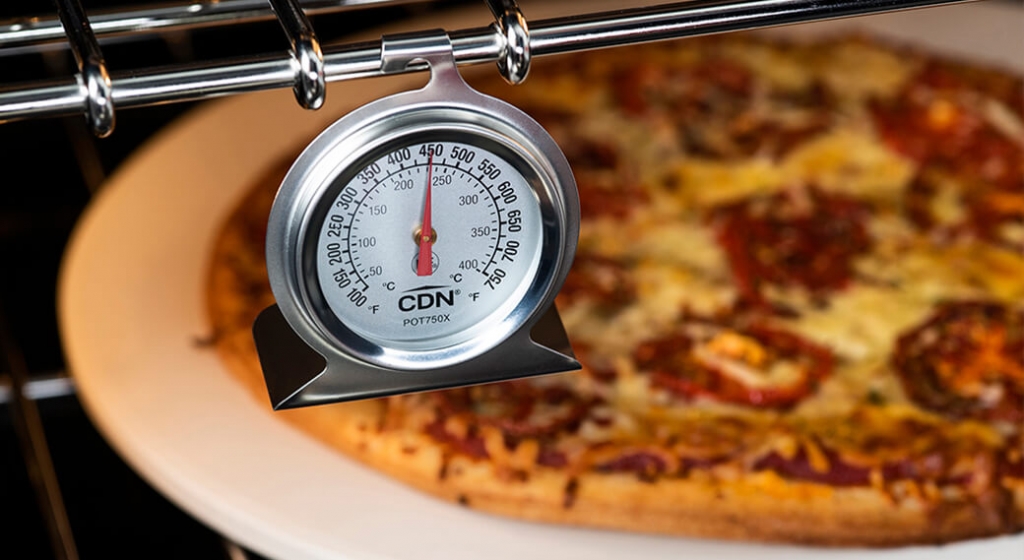Establishing a flawless routine using temperature monitoring devices in commercial kitchens is a fundamental part of food safety. When it comes to the foodservice industry, there is no one-size-fits-all commercial kitchen thermometer that can provide accurate readings for meat, dishwashers, refrigerators, liquid, heat, and everything else that requires daily oversight.
In this buying guide, we will examine the features, benefits and potential drawbacks of the most common commercial kitchen thermometer types, as well as their appropriate uses and limitations.
A word about CDN thermometers – The stem/probe thermometers reviewed in this article, with the exception of models IRT220 and DSP1, all share the following attributes:
- A 1.5mm thin tip, which is the only size approved by the FDA/ Hazard Analysis Critical Control Point management system (HACPP) developed by NASA.
- NSF certification.
- Handles and sheaths made from food-safe ABS plastic manufactured with BioCote®, the only antimicrobial approved by the HACPP International organization. BioCote® provides an extra layer of cleanliness requiring no upkeep. It is manufactured directly into the product.
- High-quality, durable 304 or 430 stainless steel.
Commercial Kitchen Thermometer Technological Types
First, we will look at four types of technology found in thermometers used in the foodservice sector: digital, including both thermistor and thermocouple, bimetal, and infrared. We will then move on to thermometers designed for specific jobs and locations around the commercial kitchen.
Digital/Thermistor Thermometers
What Are Thermistor Thermometers?
The word thermistor is a fusion of the words “thermal” and “resistor”. A thermistor is a tiny chip made of semiconductor material located in the tip of a thermometer. When the temperature changes, the thermistor exhibits a change in electrical resistance.
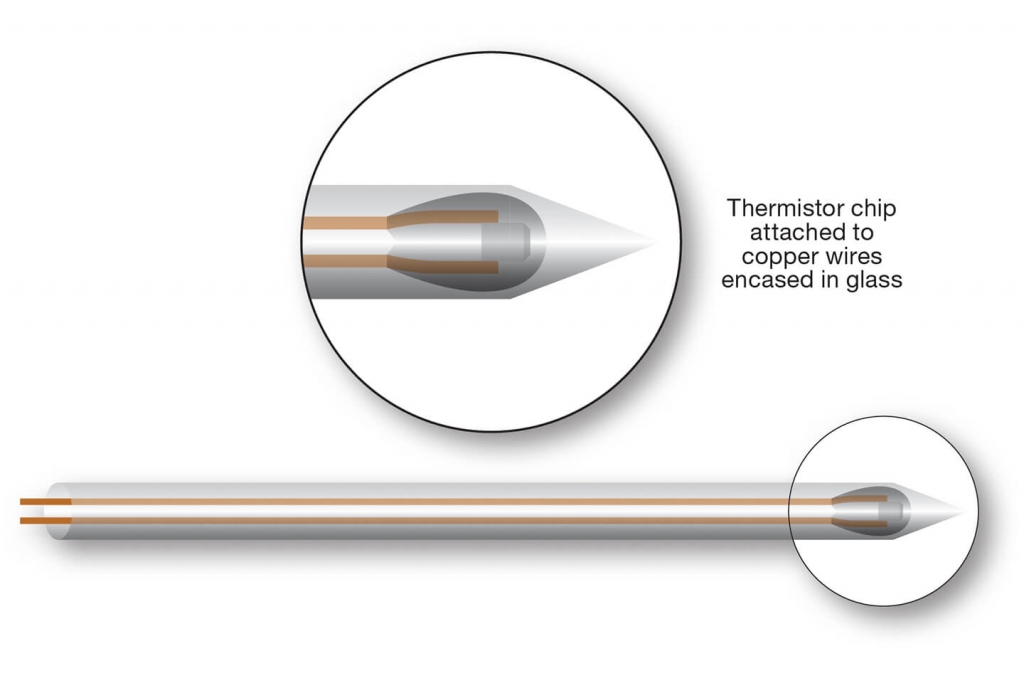
© 2021 CDN
Thermistor thermometers are very popular because of their:
- Price point. Commercial kitchens will often purchase thermistor thermometers in bulk because of their relatively low cost in comparison to other popular thermometers such as thermocouples.
- Wide use of applications in commercial kitchens. Their main application is to check the temperature of thin cuts of meat, such as fish, burgers, and chicken breast. However, they can also multitask as thermometers to check a roast, a liquid, or for general assistance when cooking.
- Convenient size. They fit perfectly inside a chef’s pocket.
Compared to thermocouples and infrared thermometers, thermistor thermometers have a much slower temperature read. Generally, thermistor thermometers can give an accurate read in six seconds or less. Six seconds may seem quick, but in a fast-paced commercial kitchen, every second counts.
Featured CDN Thermistor Thermometer – DTTW572
The DTTW572 is sleek, thin-tipped, waterproof thermometer that plays a big part in the kitchen.
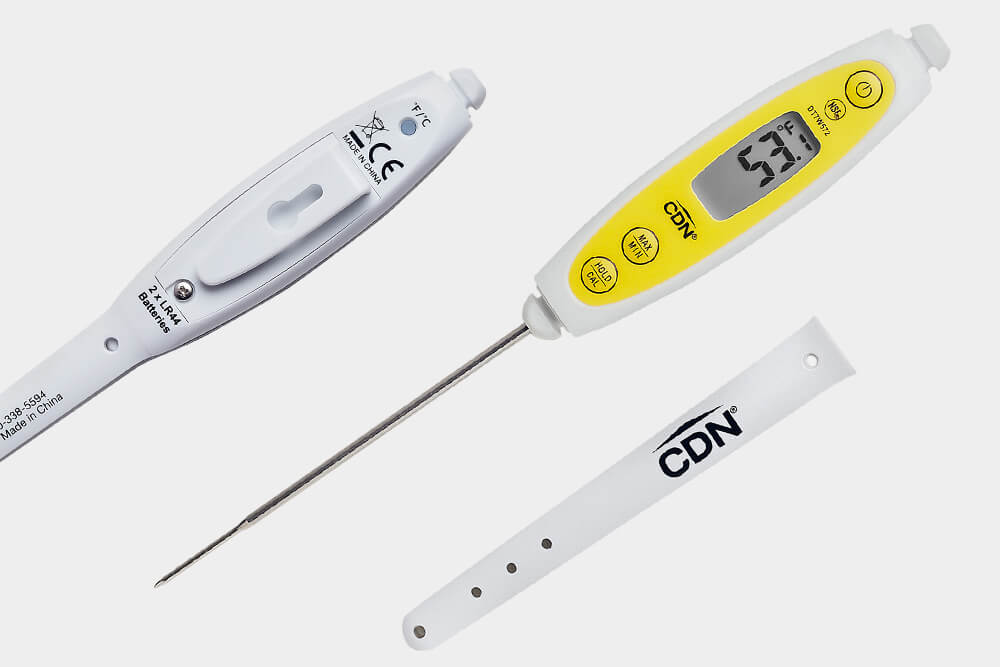
Its stem is constructed from high-quality 304 stainless steel, while the slim 1.5mm tip requires less insertion than a thicker tip, making it perfect for monitoring thin and delicate cuts of meat. The 1.5mm tip also satisfies the FDA’s food code requirement, so it is good to have some on hand during health inspections. It is the perfect size for a chef’s pocket.
The DTTW572 is a multiuse wonder and its waterproof status means it can be fully submerged into up to 3 feet of liquid for 30 minutes and live to see another day. While we don’t suggest using it in this manner, if it happens to be dropped into a pot of hot soup, the DTTW572 will not retain damage. It can handle very high heat and measures temperatures from -40° to 572°F/300°C, which is a suitable range for any commercial kitchen.
Foodservice operations will benefit from this thermistor thermometer model because it only takes four seconds to obtain an accurate temperature reading. Other convenient features include recalibration and hold.
Digital/Thermocouple Thermometers
What is a Thermocouple Thermometer?
Thermocouple thermometers generate electricity when heat is sensed and consist of two wires joined at each end.
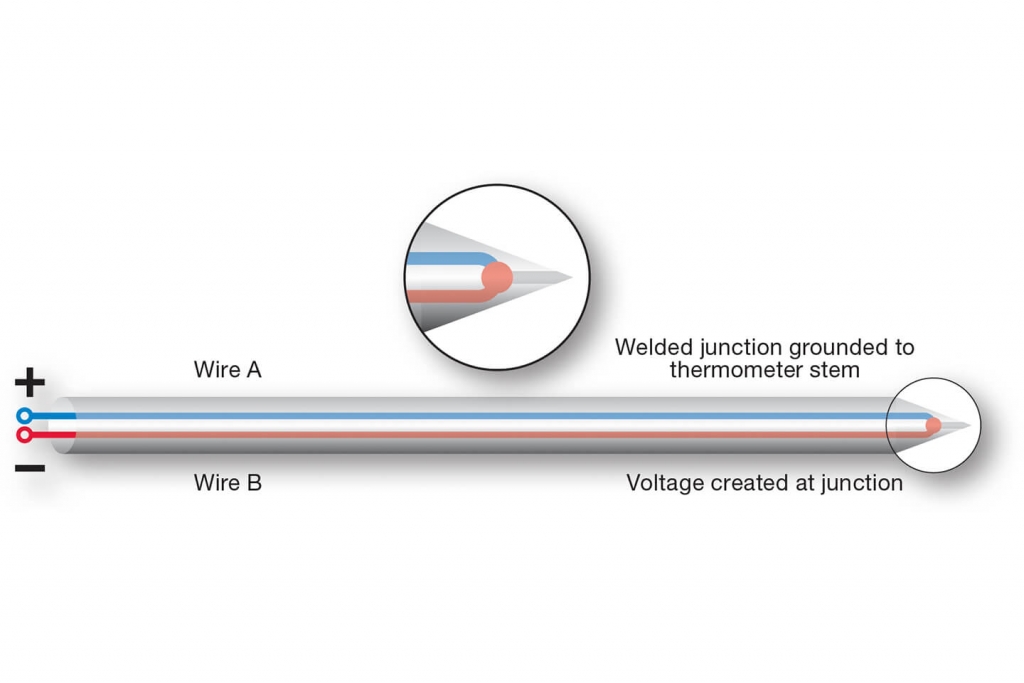
Compared to thermistor digital thermometers, thermocouples are:
- Larger, but foldable
- Significantly more expensive
However, with an increased price point also comes:
- A much faster speed. Thermocouples can take an accurate reading in as little as two seconds time.
- Additionally, they excel at high temperature readings and have a wide variety of uses including thin cuts of meat, candy, roasts, and barbeque.
Commercial kitchens love thermocouple thermometers because they speed up everything in the back of house with their fast temperature readings. In fact, thermocouples have garnered almost a cult-like following amongst chefs: once you experience a thermocouple, you’ll never want to go back. Their comparison to a quality set of knives or a perfectly curated selection of wine makes them a great gift for amateur and professional chefs alike.
Featured CDN Thermocouple Thermometer – TCTW572
The TCTW572 is a waterproof folding thermocouple thermometer with an exceptional 2-3 second response time that moves food out of the kitchen and into the dining room faster.
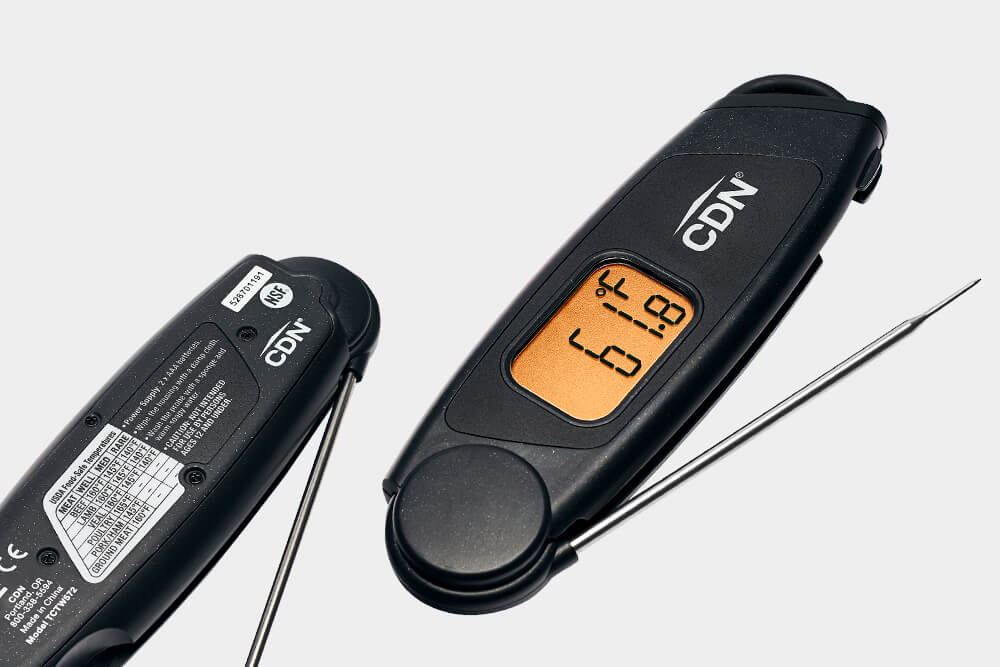
It features easy-to-read extra-large digits and a backlit display that conveniently rotates in four directions. Its one-button field calibration and auto shut off rounds out the assemblage of features making this thermometer a standout in any kitchen.
Cooking/Bimetal Thermometers
What is a Bimetal Thermometer?
Otherwise known as dial thermometers, bimetal thermometers received their name because their sensors are constructed from two bonded metals.
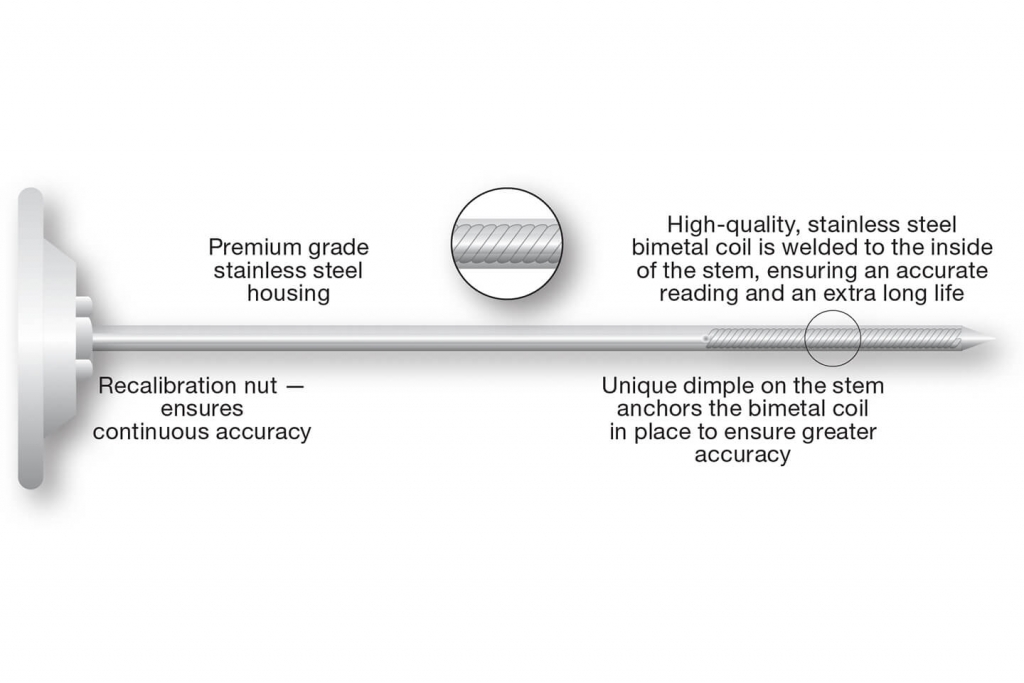
Bimetal thermometers have a lot of benefits to offer a chef or prep cook:
- They are very affordable.
- No batteries required.
- They are constructed from high-quality 304 stainless steel.
- They are calibratable which experts recommend doing a maximum of once a week. Health inspectors also tend to favor calibratable options, so it’s always a good idea to have a bimetal thermometer on hand.
- Bimetal thermometers are very durable and have a shatterproof lens, making them safe for commercial dishwashers.
Although bimetal thermometers have many benefits, the one attribute they do not excel at is speed. It takes the average bimetal thermometer a full 15 seconds to provide an accurate reading, which is much slower than modern digital options like thermocouple and thermistor thermometers.
Bimetal thermometers must be inserted deeper than their digital counterparts as well, which makes them a poor choice for thin cuts of meat. They perform incredibly well, however, with roasts and steaks. High-quality bimetal thermometer models will have a convenient dimple mark to show how deeply they should be inserted into the meat. This additional feature reduces guesswork to further ensure food is cooked, and safely served.
Featured CDN Bimetal Thermometer – IRT220
The IRT200 is a cooking thermometer that comes with a sheath that has a recalibration tool built into it.
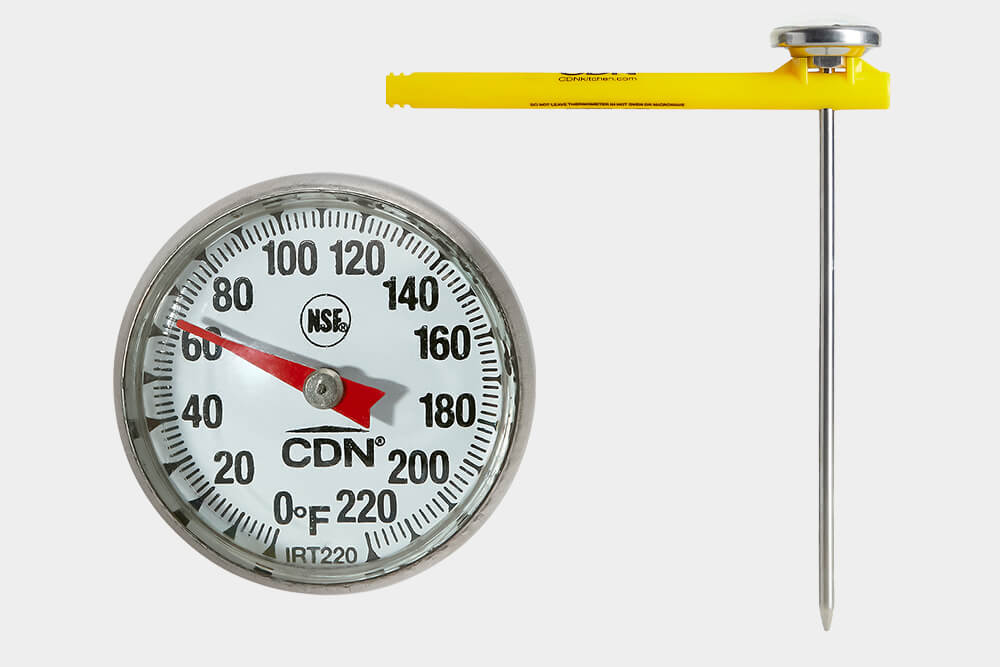
The sheath can also double as a handle extension. The lens on this thermometer is shatterproof and safe for commercial dishwashers. For extra convenience in the commercial kitchen, the dial is magnified for easier readings.
This cooking thermometer has a dimple on the stem which both shows the chef how far to insert the thermometer into food. Additionally, the dimple anchors the coil. The IRT220 will attain precise readings in foods such as meat and poultry, roasts, dough, and chocolate tempering and is a valuable resource for the foodservice industry.
Infrared Thermometers
What is an Infrared Thermometer?
The infrared spectrum was first discovered by William Hershel in the year 1800, and harnessed into countless technological applications including thermometers. This technology allows the user to measure the temperature of an object without touching it. How far away one has to be to take the temperature with an infrared thermometer depends on its distance-to-spot ratio, or in other words, the ratio of the distance to the object and the diameter of the temperature measurement area. The proximity of the operator directly correlates with the size of the area that is being measured. For instance, a thermometer with a distance-to-spot ratio of 12:1 is able to measure the temperature of a one-inch spot at 12 inches away.
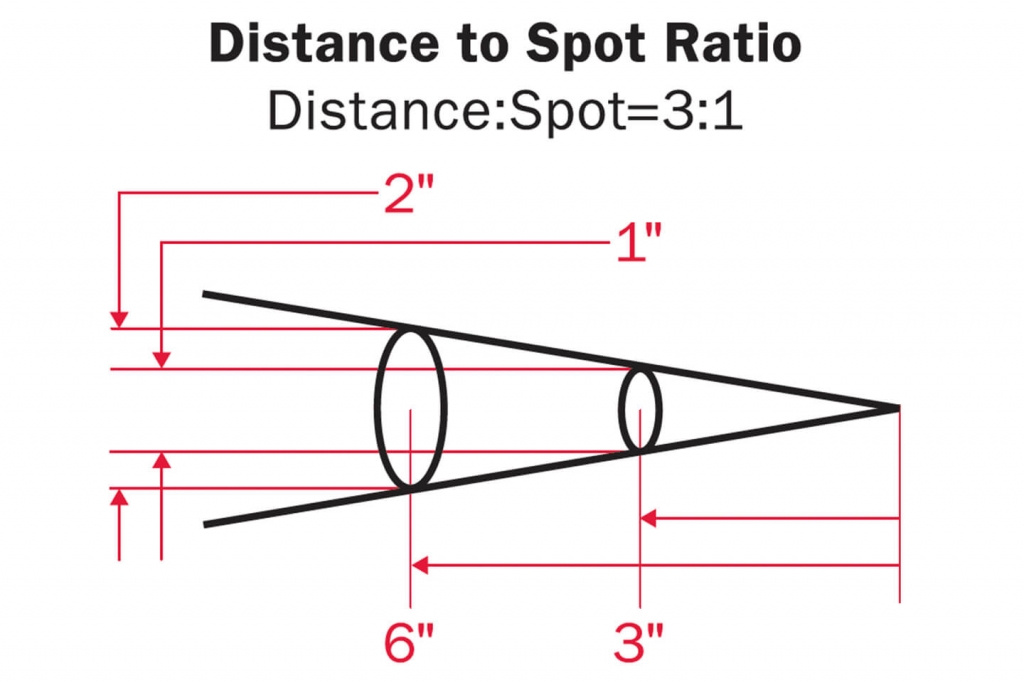
Commercial kitchens can use infrared light rays to measure the temperatures of people, grills, broilers, ambient air, and refrigerators in only one second.
Keep in mind, infrared thermometers exclusively measure surface temperatures and are unable to assess internal temperatures. However, they remain largely popular as a touchless solution in a foodservice setting.
Whether it’s a person or a grill, infrared thermometers will not touch the object being measured which:
- Reduces the potential for cross contamination between people and lowers the risk of spreading germs.
- Eliminates the need to clean the thermometer between measurements.
- Gives chefs the ability to measure temperatures of objects that are difficult to directly access.
Featured CDN Infrared Thermometer – INTP662
The INTP662 is a combination infrared gun/thermocouple thermometer.
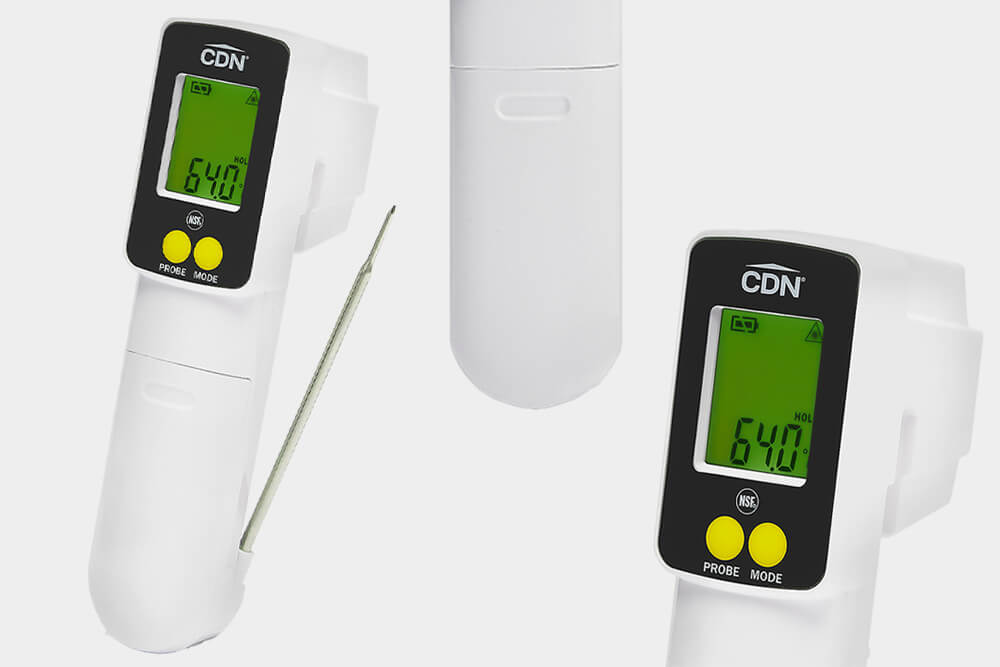
This brilliant combination allows the user to assess both surface and internal temperatures, making it an indispensable, versatile tool for foodservice operations:
- Check minimum and maximum temperatures and continually monitor for up to 60 minutes with Minimum, Maximum, and Lock modes.
- An infrared distance to spot ratio of 8:1.
- Color-coded backlighting for easy-to-read, HACCP-approved temperature guidelines.
- A flip down probe for easy access to internal temperatures.
- 8-beam laser target illumination.
- Superior response times. It takes only 1 second for an infrared reading and only 3 seconds for a thermocouple internal reading.
The dual functionality of the INTP662 also allows the chef to take a quick infrared reading of an object. If there is a problem the thermocouple probe allows instant access into an internal reading. Please keep in mind, this infrared thermometer is not suitable for measuring human body temperatures.
Specialized Thermometers
Now that we’ve reviewed popular types of commercial kitchen thermometer technology, it’s time to take a look into thermometers tasked with specific jobs and for specific locations in commercial kitchens.
Probe Thermometers
What is a Probe Thermometer?
This handy variety of thermometer consists of a probe attached to a heat resistant cable that allows the user to monitor meat as it cooks as well as the ambient air temperature inside ovens. Probe thermometers are ideal for roasting and grilling as well as convenient and easy to use. For oven roasting, the probe is inserted into the meat, and stays in the oven for the entirety of cooking time. Chefs monitor the meat and oven temperature in real time on easy-to-read digital screens.
The one potential downside to a probe thermometer when considering commercial foodservice operations is not all models are NSF-listed. They are, however, incredibly convenient for monitoring meat on a grill or in the oven and play an important role in the food safety equation.
Featured CDN Probe Thermometer – DSP1
The DSP1 is a dual-sensing, commercial kitchen thermometer and timer with a thermistor probe. Its sensing feature allows chefs to monitor the internal temperature of meat along with the ambient temperature inside an oven or under a grill cover with an easy-to-read dual progress display.
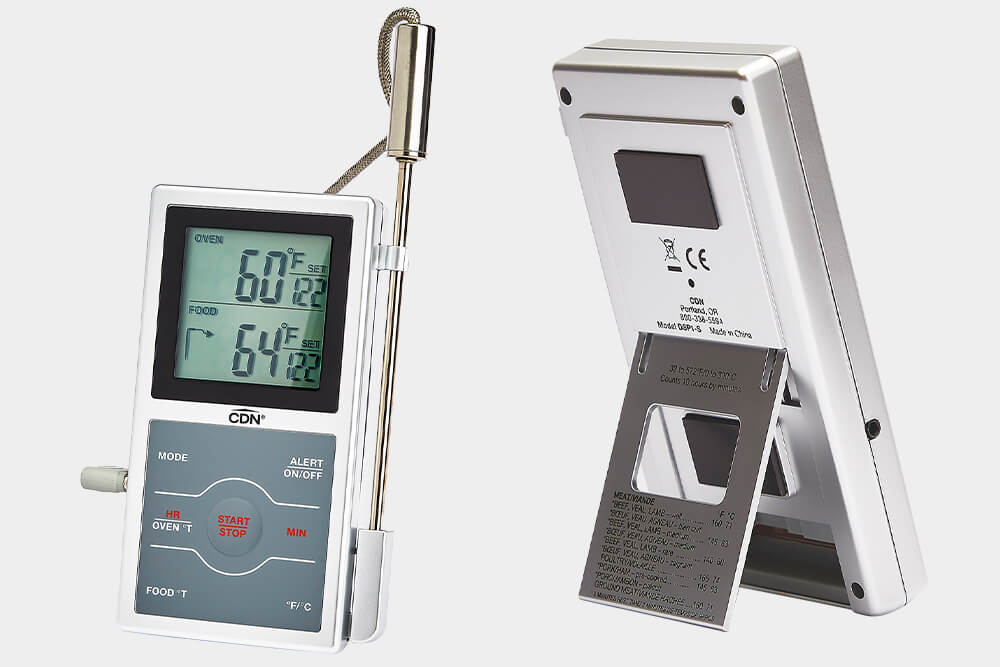
The DSP1 is an integral part of food safety because:
- Chefs can program their preferred settings for the stainless-steel probe and ambient temperature.
- The DSP1 issues distinct audible alerts when the oven has reached its goal temperature and when the food has been fully cooked.
- If the food cooks for too long, the DSP1 will sound out an overtime alert.
- The timer can be set to count up or down.
- Commercial oven doors will not damage the cord.
Additionally, this probe thermometer/timer measures between 32° to 572°F/0° to 300°C, so whether you are measuring heat or cold, your food will be safe.
Candy/Deep Fry Thermometers
What is a Candy Thermometer?
Candy thermometers are long, thin instruments used in the hard and soft candy making process as well as caramelizing, temping chocolate, and syrup and jam production. They are most often used to guarantee the proper consistency of candy which is directly related to achieving a very specific temperature. Candy thermometers also double as a thermometer for deep fryers, due to their long bodies and high heat resistance.
Featured CDN Candy Thermometer – IRXL400
The IRXL400 is a bimetal candy and jelly thermometer as well as a deep-frying thermometer for meats, poultry, yeasts, and dough.
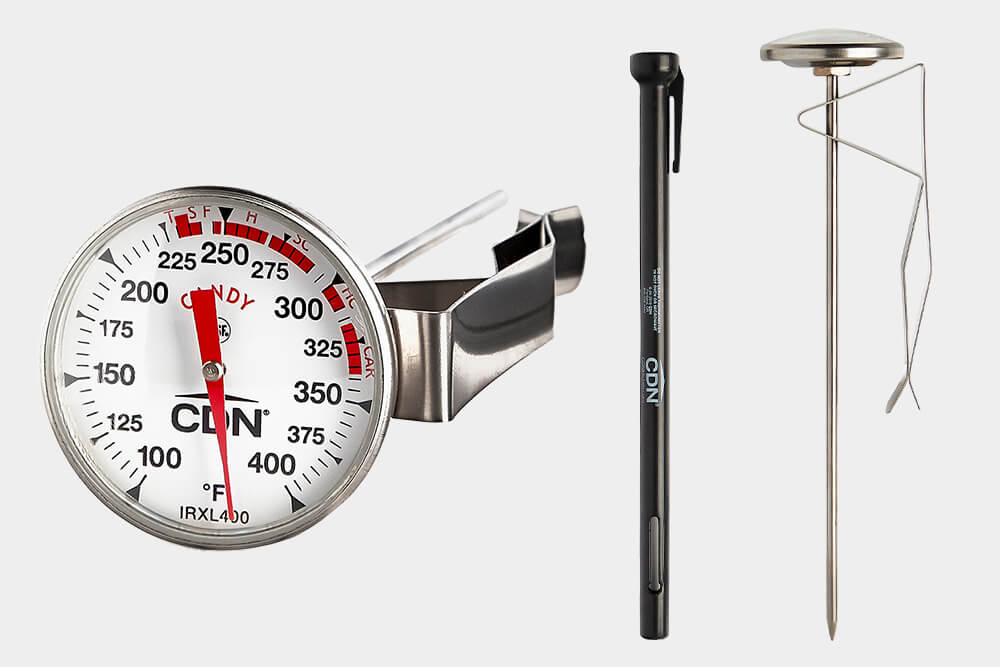
This commercial kitchen thermometer is a must for all candy makers due to its:
- Shatterproof lens
- Waterproof body
- Sheath that doubles as a handle extension and has a recalibration tool built into it
- Measurement range of up to 400°F
- 1.75” easy-to-read display
- Pot clip
Likewise, this commercial kitchen thermometer provides a color-coded target range indicator. It only takes a mere glance to make sure your sugar or oil is holding at its target temperature.
Beverage Thermometers
What is a Beverage Thermometer?
Beverage thermometers measure the temperature of liquid and frothed milk. They are must haves for any café or restaurant serving, for example, steamed milk, espresso, or tea. They are available in a variety of lengths to use with different sized pitchers.
Featured CDN Beverage Thermometer – IRB220-F
The IRB220-F is a beverage and frothing bimetal thermometer with a 5” stem, making it the perfect size for small frothing pitchers.
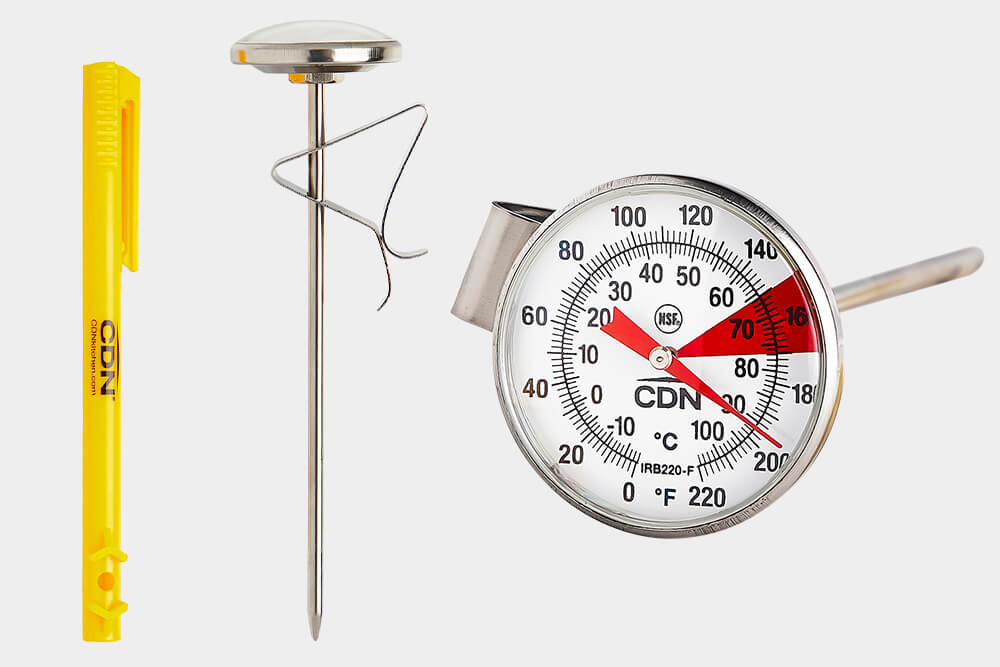
Its dial highlights the targeted temperature range and it is easy recalibrated for accuracy. This beverage thermometer also has:
- A shatterproof lens
- A measurement range of 0 to 220°F/-18 to +104°C
- The durability necessary to be safe to clean in commercial dishwashers
Oven and Grill Thermometers
What is an Oven and Grill Thermometer?
Most ovens aren’t properly calibrated, which makes oven and grill thermometers indispensable safety tools in the foodservice industry. Every oven should have an oven thermometer for safety and accurate readings. Their ability to handle very high heat allows them to sit directly on any cooking surface including directly on a grill, griddle, frying pan or barbeque.
Featured CDN Oven and Grill Thermometer – GTS800X
The GTS800X handles heat like a pro and provides accurate reads for temperatures up to 800°F/425°C.
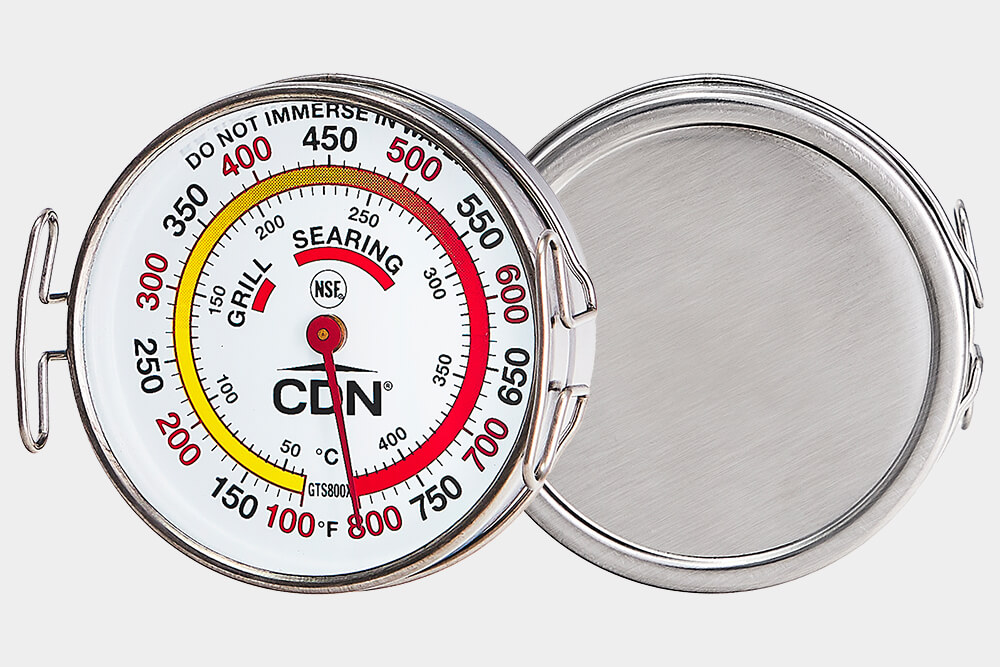
- Its heat-resistant, shatterproof body and 430 stainless-steel housing is able to sit directly on the grill or other cooking surface.
- Because it is used on hot surfaces, the GTX800X was designed with tabs for easy pickup using tongs.
- Its color-coded dial and easy to read 2.5” display indicate the correct temperature ranges for grilling and searing.
Refrigerator/Freezer/Air Thermometers
What is a Refrigerator/Freezer/Air Thermometer?
This specific type of commercial kitchen thermometer ensures food is stored at the correct temperature. Additionally, refrigerator/freezer/air thermometers help to create an energy efficient foodservice operation. Refrigerator/freezer/air thermometers are key in preventing bacterial growth and foodborne illness that occurs when food is not stored at low enough temperatures whether that’s in a commercial refrigerator, freezer, or cold room storage area.
Featured CDN Refrigerator/Freezer/Air Thermometer – RFT1
The RFT1 is a refrigerator/freezer commercial kitchen thermometer able to monitor the temperature of food storage environments with extreme accuracy.
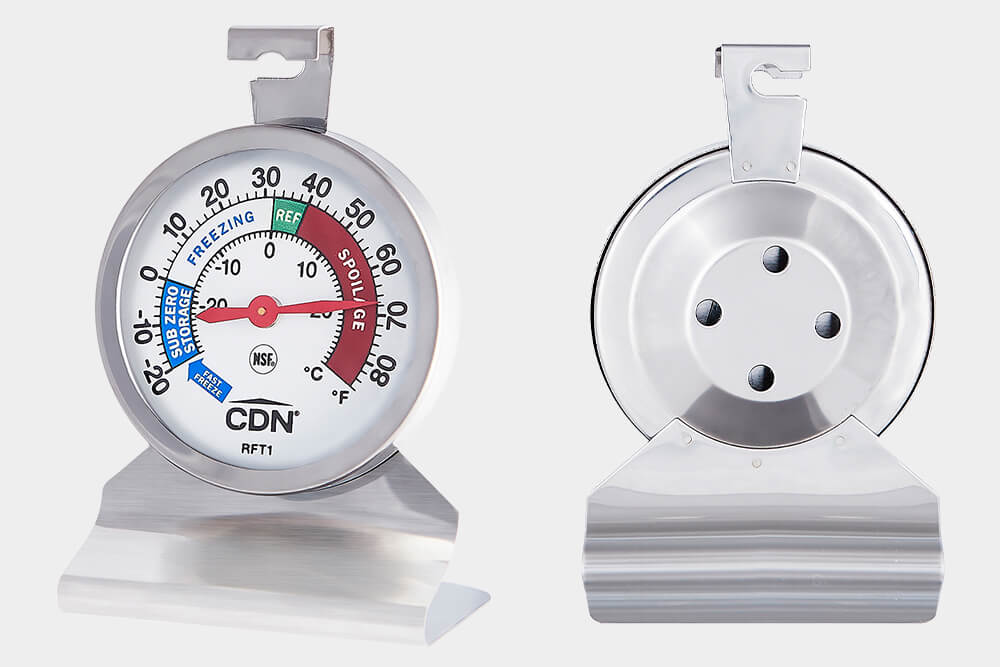
- Its measurement range is from -20°F/-30°C to 80°F/30°C.
- It can either stand or hang depending on your preference.
- The color-coded temperature guide on the dial is easy to read and understand.
- A high-quality, 304 stainless-steel construction and laboratory glass lens ensures durability in the coldest of freezers.
Dishwasher Thermometers
What is a Dishwasher Thermometer?
Dishwasher thermometers measure the required temperature inside commercial dishwashers and play a major part in food safety and sanitation. For instance, if commercial dishwashers are too cold, the water will fail to sanitize dinnerware. If the dishwasher is too hot, it could damage the items inside, increasing a restaurant’s expenses. Since the FDA mandates a utensil surface temperature of 160°F/71°C for proper sanitation, a dishwasher thermometer is a necessity to pass health inspections.
Featured CDN Dishwasher Thermometer – DW2
The DW2 is a thermometer designed to measure plate surface temperatures in commercial kitchens. During a commercial dishwasher cycle, the DW2 verifies that the maximum surface temperature of dishware is in compliance with the FDA food code.
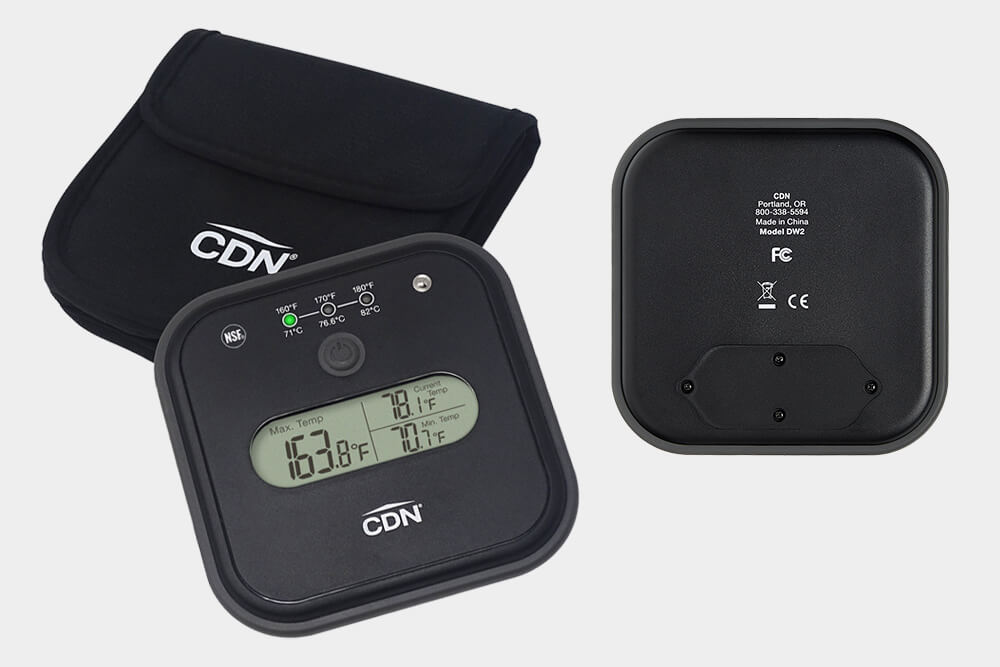
The DW2 makes FDA compliance easy with:
- Colorful LED lights that act as visual alerts when the maximum temperature range is reached during dishwashing cycles.
- Last maximum temperature recall.
- High accuracy at ±0.9°F/±0.5°C.
- Large, easy-to-read digits.
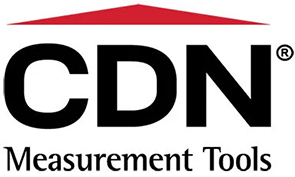
About CDN
CDN specializes in measurement tools, with a wide assortment of thermometers, timers and scales. We are a global category leader with the personal service and commitment of a business that has been family owned for over 35 years.
CDN products are sold in over 3,000 retail stores and are used in over 20,000 commercial locations, including large coffee and restaurant chains. All over the world, people rely on CDN for product innovation, superior customer service, quality and value.

